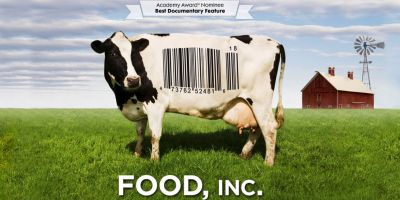
 Films to Change the World: Food, Inc.
Films to Change the World: Food, Inc.
Wednesday 14th November 2012 | Thomas
In the first instalment of the series where we look at a film that challenges the industrial complex of the way we produce our food and how, ultimately, it's a system that needs to be honestly depicted to the public so we can make an informed decision about where we want our food to come from.
We live in a society where we are largely removed from the way our food is grown, Harvested and transported. So it’s not surprising for one to be shocked, angry and somewhat disgusted when the veil on the reality of the industry is lifted. Food, Inc. does precisely that, released in 2008 (but not until 2010 in the UK) to great acclaim but limited box office success it tells us the origin of the food we buy in our supermarkets and the companies that control that process. Director Robert Kenner shows us how the mass industrialisation of the US food industry and the rapid growth of farming has come at the expense of animal welfare, the environment, farmers and public health.
We see a collection of shocking images, the way chickens are battery farmed in horrendous conditions and barely able to walk as their genetically selected trait for rapid growth prevents their bones from supporting them for more than a few steps as well as the inside of a cows stomach feed entirely on corn and the potential that has to grow cultures of dangerous bacteria. Although the publicity of free range eggs and chickens has received press and been the subject of activism in the UK, battery farming remains the dominant method of poultry farming.
The way the big food companies like Mon Santo and Tyson foods dictate the entire way that food is produced and marketed is depicted here. The companies will hire ‘illegals’ to perform a lot of factory labour, patent genetically modified crops and will bring lawsuits to anyone who challenges them regardless of whether or not they have a leg to stand on.
What perhaps is most remarkable is the story of corn farming. As the US government subsidises its production, thanks to the appropriate government agencies being run by former employees of the big food companies, the versatility of the crop allows it be refined into chemicals like high fructose syrup which contains huge amounts of calories. Such by-products of corn farming appear in multiple consumer goods like Coca Cola, meat and even pharmaceuticals. What this means is that you have a food market where unhealthy food is significantly cheaper than anything nutritious. The biggest sufferers from the system are the poor and working class citizens who can’t afford to not buy a McDonald’s burger over some fresh vegetables and end up suffering with all sorts of ill health effects.
Whilst the societal impacts do permeate all people, we do get to see stories of farmers choosing to do things differently and farming cattle on diets of grass instead of corn and choosing to raise livestock with a higher quality of life. We also see companies choosing to promote organic foods and operate within the economic system trying to get big business round to their way of thinking through influencing consumer choice. There is a significant slice of hope amongst all the despair.
Whilst the film doesn’t paint a complete picture of the industry, if fails to mention to the problems of overfishing and exploiting our oceans as a food source, it also doesn’t address the inefficiencies of organic farming and ultimately avoids the issue of overpopulation and feeding 7 billion people. However these grievances are small and the film provides a brutally honest portrayal of the food industry. Although the attitude of British viewers may be that of ‘only in America’ standpoint, it would not be wise to dismiss the problems as the struggles to feed us remain just as pertinent here as across the Atlantic.
Food Inc. is definitely an interesting and arguably important film to watch if you are at all concerned or interested about the production line of food, this piece will hopefully make you think about your eating habits and not just how they affect yourself but the ripples that our choices have throughout society.
You can find Food, Inc. on DVD or Netflix
